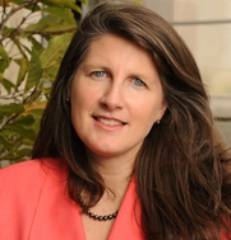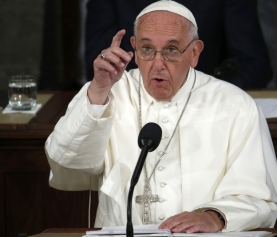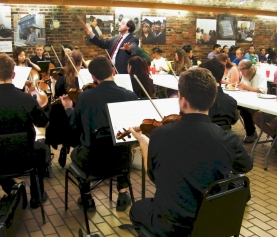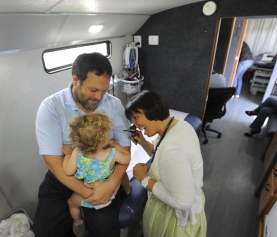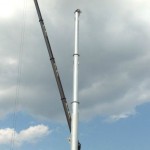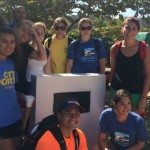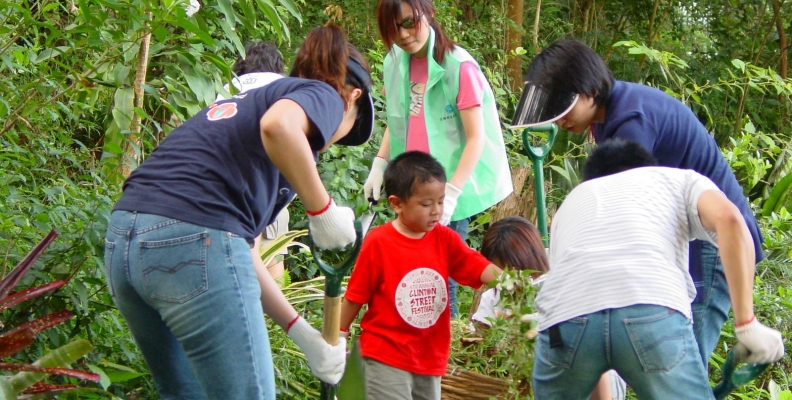
Linda Plitt Donaldson: Everything Is Connected — Caring for God’s Creation
Pope Francis described Saint Francis of Assisi as “the man of poverty, the man of peace, the man who loves and protects creation,” which inspired him to select the name Francis for his papacy. In his recent encyclical Laudato Si’, On Care of our Common Home, Pope Francis highlights the “inseparable bond . . . between concern for nature, justice for the poor, commitment to society, and interior peace.”
Pope Francis reminds us that caring for creation is not only about caring for the planet; it also includes caring for humanity, especially the poor. In this encyclical, Pope Francis repeatedly states that “everything is connected,” and throughout he underscores the “intimate relationship between the poor and the fragility of the planet.” He speaks explicitly about the impact of pollution and dangerous waste producing “a broad spectrum of health hazards, especially for the poor, [that] cause millions of premature deaths.” He addresses the warming effects that compromise “their means of subsistence [which] are largely dependent on natural reserves and economic systemic services such as agriculture, fishing, and forestry.” He adds that the suffering of the poor is compounded because they have no financial resources to help them adapt to the effects of climate change.
He draws on the ample scientific evidence that climate change risk is severely acute in developing countries and has caused destruction, displacement, and forced migration of people in many poor communities. The report by the 2015 UCL-Lancet Commission on Health and Climate Change warns that “the effects of climate change threaten to undermine the last half-century of gains in development and global health.” Pope Francis notes the differences between the global north and the global south, and takes to task multinational corporations who “do [in developing countries] what they would never do in . . . the so-called first world . . . leav[ing] behind great human and environmental liabilities such as unemployment, abandoned towns, the depletion of natural reserves, deforestation, the impoverishment of agriculture and local stock breeding, open pits, riven hills, polluted rivers and a handful of social [services] which are no longer sustainable.”
Climate change is also impacting communities in the United States, and there are businesses that engage in practices that exploit low-income communities for their own profits. Readers may remember the film Erin Brockovich as one Hollywood depiction of the environmental impact of corporate practices that undermined the health of low-income residents. The Catholic Campaign for Human Development (CCHD) has funded several community organizing projects to address environmental justice. The Delmarva Poultry Justice Alliance is one example of a CCHD-funded effort and is highlighted in John Hogan’s wonderful book Credible Signs of Christ Alive.
In paraphrasing Ecumenical Patriarch Bartholomew, Pope Francis asks us to “replace consumption with sacrifice, greed with generosity, [and] wastefulness with a spirit of sharing.” Pope Francis also realizes that such changes of behavior and attitude will take a conversion of hearts, so he has declared Sept. 1 as the World Day of Prayer for the Care of Creation. In addition to a conversion of hearts, Pope Francis recognizes that we need community organizing, particularly grassroots movements, to address the structural factors that feed the “mentality of profit at any price, with no concern for the social exclusion or the destruction of nature.” At the World Meeting of Popular Movements in July, Pope Francis encouraged people who are poor to organize for social change. In offering gratitude and hope, he stated: “You, the lowly, the exploited, the poor and underprivileged, can do, are doing, a lot. . . . the future of humanity is in great measure in your own hands, through your ability to organize… You are the sowers of change.” Social workers have a long history of community organizing. Let’s join with our brothers and sisters in organizing to care for God’s creation — our planet and all of humanity — particularly our neighbors near and far who are poor, vulnerable, and excluded.
— Linda Plitt Donaldson is an associate professor in The Catholic University of America National Catholic School of Social Service.

